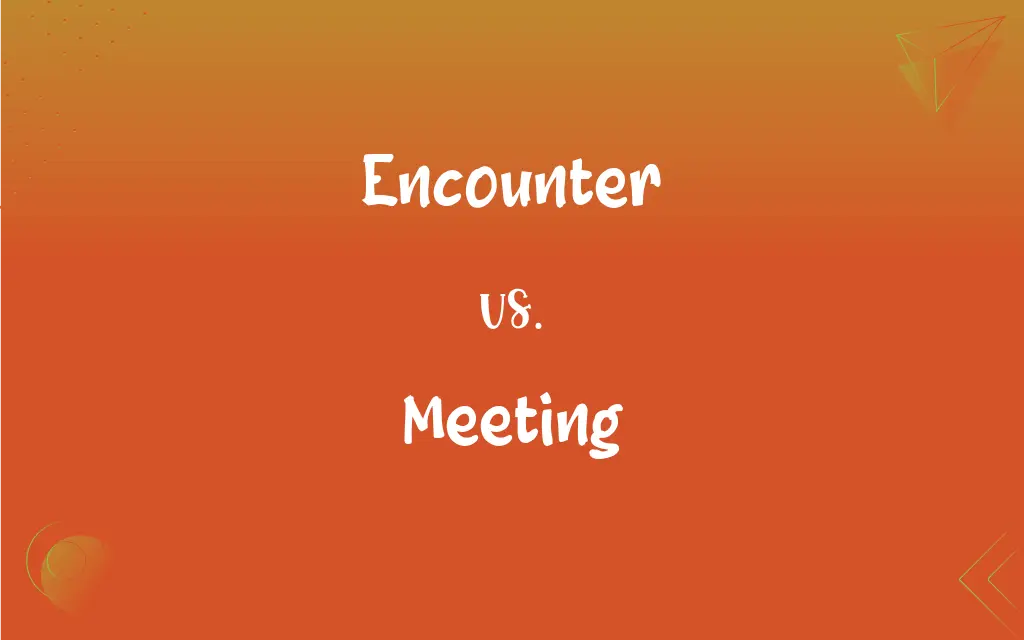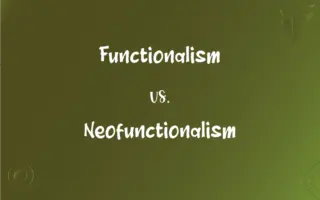Encounter vs. Meeting: What's the Difference?
Edited by Aimie Carlson || By Harlon Moss || Published on December 30, 2023
An encounter is an unexpected or casual meeting, while a meeting is a planned or formal gathering of people for a specific purpose.

Key Differences
An encounter typically refers to an unplanned or chance meeting between people or groups, often brief and casual. In contrast, a meeting is a prearranged gathering where individuals come together for discussion or decision-making.
Encounters can occur spontaneously in various settings and often involve brief interactions. Meetings, however, are usually organized with a specific agenda, time, and place, focusing on particular topics or objectives.
The nature of an encounter is often informal and can happen between strangers. Meetings, on the other hand, are formal events that may involve colleagues, business partners, or members of an organization.
In encounters, the interaction is typically brief and may not have a significant impact. In meetings, participants engage in more structured discussions, often leading to decisions, plans, or outcomes.
Encounters can be fleeting and may not require follow-up, whereas meetings often result in action items, future plans, or continued dialogue among participants.
ADVERTISEMENT
Comparison Chart
Planning
Usually unplanned or spontaneous
Planned and scheduled
Formality
Informal and casual
Formal and structured
Participants
Can involve strangers
Often involves known individuals
Duration
Generally brief
Longer with a defined agenda
Outcome
May not lead to further action
Often results in decisions or plans
ADVERTISEMENT
Encounter and Meeting Definitions
Encounter
An encounter can be a confrontation or unexpected experience.
The encounter with the CEO was more intimidating than expected.
Meeting
A meeting is a gathering of people for discussion or business.
The board meeting is scheduled for 3 PM tomorrow.
Encounter
An encounter is an unexpected meeting with someone or something.
She had a pleasant encounter with an old friend at the park.
Meeting
A meeting can be a formal or informal session among members.
The team had a brief meeting to plan the project’s next steps.
Encounter
An encounter is a chance interaction between individuals or groups.
The unexpected encounter with a famous author inspired her.
Meeting
Meeting denotes an arranged gathering for exchange of ideas.
The international meeting brought together leaders from different countries.
Encounter
Encounter refers to a brief or casual meeting, often by chance.
During his hike, he had a close encounter with a wild deer.
Meeting
Meeting refers to an assembly or conference with a specific purpose.
They held a community meeting to discuss neighborhood issues.
Encounter
Encounter denotes coming across or facing a situation or person.
They encountered several challenges while climbing the mountain.
Meeting
A meeting is an event where people convene to make decisions.
The annual shareholders' meeting is crucial for company policies.
Encounter
A meeting, especially one that is unplanned, unexpected, or brief
A chance encounter in the park.
Meeting
The act or process or an instance of coming together; an encounter.
Encounter
A hostile or adversarial confrontation
A tense naval encounter.
Meeting
An assembly or gathering of people, as for a business, social, or religious purpose.
FAQs
Are meetings always formal?
Meetings can be formal or informal, depending on their context and purpose.
What is a meeting?
A meeting is a planned gathering of people, often with a specific agenda or purpose.
What defines an encounter?
An encounter is an unexpected or casual interaction with someone or something.
Can an encounter be planned?
Typically, encounters are spontaneous and not planned.
Are meetings always in person?
Meetings can be in person or virtual, such as video conferences.
Do encounters have agendas?
Encounters usually do not have a set agenda, unlike meetings.
Do meetings require preparation?
Most meetings require some level of preparation, especially formal ones.
Can an encounter be a confrontation?
Yes, an encounter can sometimes be a confrontation or challenging experience.
Are all meetings formal gatherings?
Not all meetings are formal; some can be informal gatherings or discussions.
Is an encounter less important than a meeting?
Not necessarily; the importance of an encounter depends on its context and impact.
Can encounters lead to meetings?
Yes, an initial encounter can sometimes lead to a planned meeting later.
Do encounters have outcomes?
Encounters may not have specific outcomes, unlike meetings which often aim for results.
Is a meeting a type of encounter?
A meeting can be considered a specific type of encounter, one that is planned and structured.
Can an encounter be memorable?
Yes, encounters can be memorable, especially if they are significant or unexpected.
Can a meeting occur between strangers?
Yes, meetings can occur between strangers, especially in professional contexts.
Is an encounter always brief?
While encounters are often brief, they can vary in duration.
Are meetings only for business?
Meetings can be for various purposes, including business, social, or community issues.
Can an encounter be planned like a meeting?
While encounters are typically spontaneous, some can be semi-planned, such as running into someone at a known event.
What is the main purpose of a meeting?
The main purpose of a meeting is to discuss, decide, or collaborate on specific topics or issues.
How do people prepare for meetings?
Preparation for meetings often involves setting an agenda, gathering necessary materials, and knowing the participants.
About Author
Written by
Harlon MossHarlon is a seasoned quality moderator and accomplished content writer for Difference Wiki. An alumnus of the prestigious University of California, he earned his degree in Computer Science. Leveraging his academic background, Harlon brings a meticulous and informed perspective to his work, ensuring content accuracy and excellence.
Edited by
Aimie CarlsonAimie Carlson, holding a master's degree in English literature, is a fervent English language enthusiast. She lends her writing talents to Difference Wiki, a prominent website that specializes in comparisons, offering readers insightful analyses that both captivate and inform.






































































